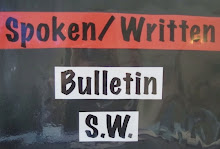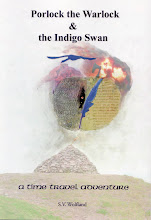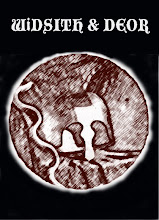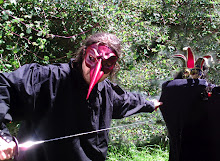It's always amazing to see a stage of completion in a long cherished project, and the printing of 'Geometrica' (my latest chapbook) is just that. I would have written a blog about it at the turn of the year, but things have got in the way, and blogs about events seemed more of immediate urgency (if a non-current affairs blog can be urgent).
However, I have at last scanned the cover! of it. And I must say, it looks to me like the best thing I have ever done. It's always a difficult balance as an artist - what you most wish to pursue, and what 'the market' is most interested in. There are surefire sellers - 'Porlock' being an obvious example. As an all ages historical adventure novel, it caters for a huge range of folks and occasions, and the most recent reason given for buying a copy was a guy who was taking a long plane journey and wanted something to read on the flight! Then there are the slightly niche but still targeted areas of creativity - 'The Books of..' being the example here. Political satire mixed with poetic commentary, the readership is never going to be as wide, but it goes down well at green fairs, respect festivals, and would sell at demos, marches, outside the Leftfield Tent at Glastonbury and suchlike.
'Geometrica' on the other hand is (and for someone who works compiling information for and attending the live lit scene it feels that way) for the literary few. Written with a seriously unfashionable view that poetry is only sometimes meant for 'expressing shared and common experience'. Evidently 'The Books of...' are meant to make you think - to illuminate the News and the issues which it throws up, in another light. A common experience of the hearsay that is the News, but other takes on it. But some poetry is meant to throw a light on
uncommon experience or things from the past that one cannot know, or only from old sources. My ideal (as like many poets I would rather have been a visual artist) is to express in the medium of words - form, colour, shape and structure. In this case, geometric shapes, and/or things expressed through geometry. 'Decagonal' for instance refers to a ten sided shape, or ten pointed star, and is inspired by the beautiful History of Science Museum in Oxford. The Museum is full to the brim with sundials, astrolabes, armillary sundials, and all manner of exquisite historical scientific instruments from a time that looks as if art and science weren't so very distant from one another. Amongst its many treasures, it also boasts a polyhedral sundial and a moondial! The latter as the name suggests, being for making out the time when there is a moon visible, and the former an extravagant 'conceit' of diallists, i.e. a bit of showing off by those who construct sundials, in that it is a three dimensional geometric shape of many faces, each one with another sundial, of slightly different type and function. One exhibit is in a many sided display case, hence the idea for the name 'decagonal'. It seems to be a wonderful way of expressing relationships - a monogon/henagon is a circle, a digon a line between two points, (in 'degenerate and Non-Euclidean' maths) and then things really speed up! Triangle/trigon, square/quadrilateral/tetragon, pentagon, hexagon, septagon/heptagram, octogram, enneagram/nonagram, decagram, hendecagon, dodecagon...I am mixing up sided shapes with pointed shapes, but you get the idea. (Eg; octagons are eight sided shapes, octagrams are eight pointed stars.) I have always thought that this is a fantastic way to explore relationships in an angled/abstract way. The love triangle is commonly used, but less well trodden are looking at five couples as a decagon, or a group of six close friends as a hexagram. In 'Geometrica' I have not used this in any way as a tight construction/correlation, let alone attempted an algebra of relating! But this was a kind of backdrop, an idea in mind when writing the pieces for the collection. For various reasons, probably to do with a preoccupation with the C17th, philosophy and geometry are intertwined together for me, artistically/creatively, and so many of the pieces were written at philosophy conferences. I suppose the connection for me being that the former attempts to comprehend the world, and the latter to symbolize it, to be horribly simplistic.
To relate philosophy and geometry in poetry is like thinking of abstract art/Expressionism and architecture as synonymous. But if one thinks of Kandinsky and Feininger's paintings and Frank Lloyd Wright's buildings, and then thinks of when architecture has been portrayed by art in three dimensions by artists in the form of the sets for the film 'The Cabinet of Dr. Caligari', then I hope it makes more sense, or becomes clearer why I would choose to do so.
However people may prefer 'The History of This House in Twenty Objects' when finished, or other works entirely, still 'Geometrica' is the thing I most care about, and am most glad to see in print. The visual textworks (unfinished yet in terms of enough for an exhibition) come close, but really, this chapbook is my joy and pride. It matters that people like it and buy it, but ultimately, like much art that is made in many of the artforms, it just had to be done. It occurred because it IS the work about which I care most, and because of the kindness of various libraries and resources for putting the historic images which I desired to complement the text, within my reach.
And so the text is studded with timeless images from the likes of Leonardo da Vinci, Wentzel Jamnitzer (master of the dodecahedral image), a fragment of the famous Flammarion woodcut, a piece from Andreas Cellarius' justly famous star atlas the 'Harmonia Macrocosmica', sundials and other wondrous things.
There have been times when I thought it would never be finished - the right images, rejecting many poems originally intended to be part of it, re-writing, editing, changing last verses at last minutes, for some time the stasis of no longer getting to philosophy conferences once many of my contacts in academia had lapsed due to study periods ending at institutions, and might as well have been writer's block, for all that they were surmountable with anything other than persistence and trial. But here it is at last, and I never tire of looking at it, which is (rather than egotistical) I prefer to think, just as well!
Thinking of not having access to the major manuscript libraries, and more importantly a password for the Humanities Index or Jstor (the resources that allow access to all the latest papers and research articles in countless branches of knowledge, and that ceases to be open to you when you are no longer a member of a university), I am immensely grateful to the University of Heidelburg, George Hart the geometric and polyhedra artist, and others who have permitted public access to their wonderful art and visual culture archives. Sites such as the Gallica Digital Library / Bibliotheque Nationale de France make research into more of a joy than endless frustration, and it's a real privilege to have somewhere I can thank them for making the completion of 'Geometrica' possible, (not to mention a dozen other branches of research for writing and the simple pursuit of knowledge).
Check them out at;
Gallica Digital Library;
http://gallica.bnf.fr/?lang=EN
University of Heidelburg Art History section;
http://www.ub.uni-heidelberg.de/Englisch/helios/fachinfo/www/kunst/digilit/architektur/welcome.html
George Hart, polyhedra and geometric artist;
http://www.georgehart.com/






